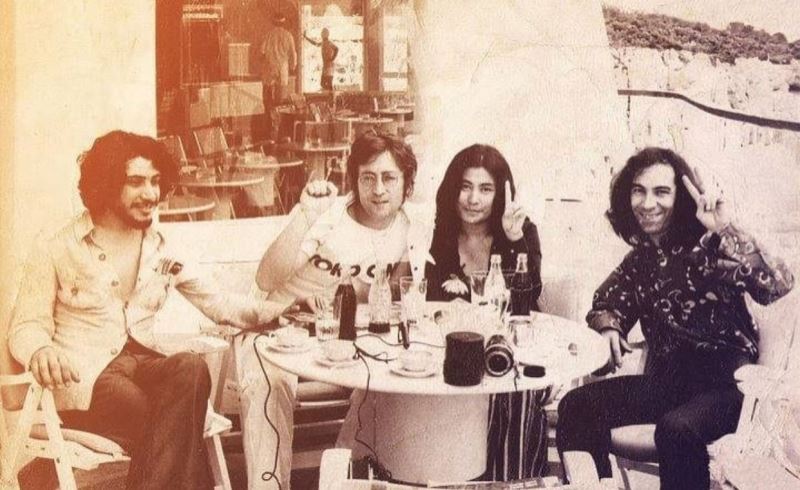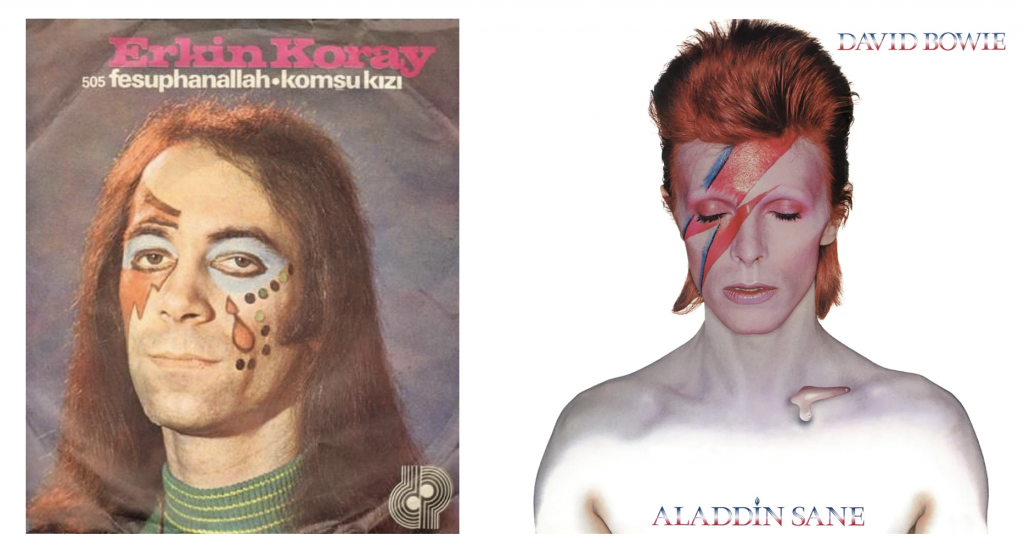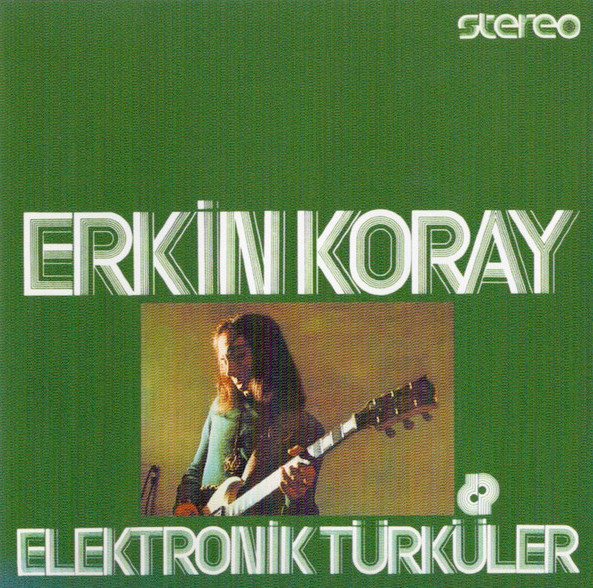The term ‘musical legend’ is overused, but in the case of Erkin Koray it is entirely justified. The free-spirited, guitar-playing singer-songwriter is one Turkiye’s most significant artists of the past 60 years; a pioneer of Anatolian and psychedelic rock, the composer of some of Turkiye’s most memorable hits and, together with Orhan Gencebay, the inventor of the electric saz.
On 7 August 2023, Koray’s daughter Damla announced on social media that her father had died from an incurable lung condition in a hospital in Toronto, Canada. He was aged 82.
The news that this national treasure had passed away plunged Turks worldwide into mourning. Tributes poured onto social media and in the press from all corners of Turkish society, from politicians to pop stars.
President Recep Tayyip Erdoğan tweeted, “It is with sadness that I learned of the death of Erkin Koray, one of the doyens of Turkish music. May Allah have mercy on the deceased; My condolences to his family, all his fans and our arts community.”
Tourism Minister Mehmet Nuri Ersoy tweeted, “We are deeply saddened by the loss of Erkin Koray, the master of Anatolian Rock music, who has been engraved in our memories with unforgettable songs such as Cemalim, Fesuphanallah, and Çöpçüler [Scavangers]”.
Other politicians also shared their sadness at Koray’s death, including Health Minister Fahrettin Koca and opposition leaders Kemal Kılıçdaroğlu, Meral Akşener and Ali Babacan.
Akşener, called Koray a musical “maestro”, who “won the appreciation and love of our nation with his legendary songs that touched our hearts, and left an unforgettable legacy to our culture.”
Many of Turkiye’s biggest pop and rock stars also paid tribute to the artist they affectionately called “Baba” [Father], whose musical influence had spanned more than six decades and was spread far beyond the borders of Turkiye.
Kalbimize işleyen efsane şarkılarıyla hem milletimizin takdir ve sevgisini kazanan hem de kültürümüze unutulmaz bir değer mirası bırakan usta sanatçımız Erkin Koray’a Yüce Allah’tan rahmet, sevenlerine baş sağlığı diliyorum.
Ruhu şad, mekânı cennet olsun… pic.twitter.com/Vbsi4QvXdk
— Meral Akşener (@meral_aksener) August 7, 2023
Koray’s friend and collaborator Orhan Gencebay wrote: “May you rest in heaven, my old friend, my dear brother Erkin Koray. My sadness is indescribable. You will always live with your immortal works. Rest in peace.”
Rocker and philanthropist Haluk Levent wrote: “Whatever I say, words will be inadequate. Baba! I will miss you so much.”
Folk singer Sabahat Akkiraz: “Oh dear #ErkinKoray, I told you not to scare us. You left us too. I am really sad. There are few artists who have influenced their people so deeply and left their mark. Our art family is a little less. May you sleep in heavenly light.”
Top music producer, composer and musician İskender Paydaş also penned a heartfelt note on social media: “His brother Korkut Koray was the drummer of my father’s orchestra, I grew up with him. His niece Tayla Koray is my friend since we were babies…
“It will be very hard for me to believe that my brother Erkin, who has been in my life for as long as I can remember, had the opportunity to work with, whom I asked after about a week ago, and who is truly an immortal hero for me, has migrated from this world. I’m so sorry so…”
Posting a photo of herself with Erkin Koray from 1996, singer-songwriter Nazan Öncel referenced the endearing nature of the rock star’s classic hits in her tribute: “Is there anyone among us who does not say Fesuphanallah? Or weren’t we the ones who didn’t get on the Gönül Salıncağı [Heart’s Swing], and said that Blind Scavengers had swept away my love?”
View this post on Instagram
Comedian Can Yılmaz, older brother of the better known Cem Yılmaz, wrote: “He was not just a rock musician, he was the voice of my youth, the melody of my memories. Goodbye Erkin ‘Baba’ we will not forget you either…”
Who was Erkin Koray?
Mustafa Erkin Koray was born in Kadıköy, Istanbul, in 1941, the older of two boys. Erkin’s younger brother Korkut was born in 1943 and also became a musician, playing drums and percussion. The two didn’t speak for much of their adult lives.
Erkin’s musical journey began at a young age, learning to play the piano courtesy of his mother, a piano teacher. He progressed to playing the guitar as a teen and with American rock and roll getting airplay in Turkiye, as elsewhere, the young Erkin was keen to emulate the music of his early western idols, Elvis Presley and Fats Domino.
While a student at İstanbul Alman Lisesi [Istanbul German High School] in the 50s, Koray formed an amateur band – Erkin Koray ve Ritmcileri – with friends, playing cover versions of Elvis, Fats Domino and other popular rock and roll songs of that time.
Koray continued to play as a semi-professional musician after graduating from high school and into the early 60s, gigging at bars and music clubs. By this time, he was also penning his own music.
The first Turkish rock record
While performing at one music venue in 1962, Koray received an invitation to go into a studio and record a 45 single. One side of the single had Bir Eylül Akşamı [‘One September Evening’], with an English song, “It’s So Long”, on the other side. The record didn’t end up being released until 1966 though, as Koray was obliged to do his military service first.
Even there, Koray’s musical talents helped him to avoid frontline duties. He ended up performing as a soloist and guitarist in the Turkish Air Force Jazz Orchestra in Ankara between 1963-1965.
After completing his military service, Koray decided to travel to Germany. He met with a local band called The Hiccups in Hamburg and started playing with them for a few months. He returned to Turkiye with The Hiccups’ bass guitarist, Bernhard Weber, and the pair formed a new band with local friends, which initially didn’t have much success.
By this time, Koray had started to grow his hair long, a nod to the alternative lifestyle that was taking hold around the world at that time.
He released a new 45 in 1967, which had Kızları da Alın Askere [‘Admit Girls into the Army Too’] on one side. The song is widely regarded as the first Turkish rock song and helped propel Koray in front of a bigger audience in Turkiye eager to sample rock in their own language.
Other purveyors of Anadolu rock were also emerging at this time, including Barış Manço, Cem Karaca, and Moğollar, collectively creating an exciting new scene for young music fans in Turkiye.
In 1968, Koray entered Altın Mikrofon [Golden Microphone], a popular contemporary Turkish music contest run by Hürriyet newspapar. Koray, who sang and played guitar, and his band came fourth, but a record company approached them wanting to releasee their two songs, the dreamy psych rock Meçhul and instrumental track Çiçek Dağı, on a double-sided 45.
The record went on to sell in excess of 800,000 copies, while Koray and his band performed gigs and got more live music club and bar work. It was around this time that bass guitarist Taner Öngür also joined Koray’s band.
Meeting John Lennon and Yoko Ono
By the start of the 1970s, Koray was starting to come into his own as a pioneer of a new underground sound in Turkiye. His band Yeraltı Dörtlüsü [the Underground Quartet], which he formed in 1969, included Sedat Avcı on drums, Ataman Hakman on guitar and Aydın Buyar Şencan on bass guitar.
Yeraltı Dörtlüsü’s first concert was at Istanbul City Cinema in January 1970. The first part of the gig the band played covers of famous rock bands of that time, such as Cream, Jethro Tull and Pink Floyd. In the second half, the band played songs Koray had composed. The band helped introduce Turkish fans to psychedelic rock songs, releasing a variety of songs that put their own unique stamp on this underground style of music.

The band split when Koray opted to return to Europe in 1971, ending up at the Cannes Festival with his friend Arda Uskan, who worked for Hey music and youth magazine. They ended up watching Apotheosis, a short film produced by John Lennon and Yoko Ono.
The pair ended up meeting Lennon and Ono afterwards and Koray played Lennon some of his music, including Mesafeler, which two years later became a massive hit for Koray.
The former Beatle is said to have offered to host the talented Turk in Europe, but Koray declined, preferring to return to Turkiye at the end of summer, where he went on to play with diverse musicians in different bands.
The height of Erkin Koray’s fame
By 1973, Koray was primarily a solo artist who was achieving hit after hit in Turkiye. Yet 1974 was arguably Koray’s most successful year as an artist, releasing multiple double A-sided singles that became instant classics, such as Şaşkın / Eyvah, Krallar / Dost Acı Söyler and Feshupanallah / Komşu Kızı. Koray’s musical accomplices were Nihat Örerel on drums and Rauf Ülgün on bass guitar.
Koray’s creative side was coming through in other ways too. He drew the psychedelic cover of Krallar / Dost Acı Söyler, showing eyes projecting purple beams and a mountain. No doubt influenced by David Bowie’s 1972 Ziggy Stardust character, Koray appeared with a painted face on the cover of Feshupanallah.

In later years, there would be controversy over whether Feshupanallah was indeed Koray’s song, or whether he had ripped off Weily Weily, a song written by Lebanese composer Romeo Lahoud and recorded by singer Samir Yazbek.
In 1974, Koray recorded his first full-length studio album, Elektronik Türküler, with Sedat Avcı and bass guitarist Ahmet Güvenç.
Koray’s first long play, a self-titled LP featuring 12 of his hit singles, was released without his permission by Istanbul Plak in 1973.
For Elektronik Türküler, Koray penned most of the eight tracks, combining Turkish folk with psychedelic and progressive rock to create the Anatolian rock sound he had helped pioneer. Koray and Avcı play a host of instruments between them, including guitar, saz, piano, organ, tambourine, bongos, drums, and vocals. The album, which included the hauntingly trippy track Cemalım that features Koray’s hypnotic vocals and a great guitar solo by him, was re-released in 1999 by World Psychedelia Ltd.
From 1975 to 1984, Koray would spend most of his time abroad in the Netherlands, Germany and Canada. He continued to release hit music, including Estarabim and Arap Saçı, which fused psyc rock with Arabesque and Turkish folk. His band members during this period including percussionist Okay Temiz, who played drums for Koray, while Orhan Ünal and Harun Kolçak were on guitar and bass guitar respectively.
His 1977 album Erkin Koray Tutkusu featured two English songs, Blond Man and My Delight, both penned by Koray and recorded in the Netherlands. Shortly after the album’s release, Koray and his band when on a European tour.
Falling star and financial struggles
Early in the 1980s, Koray collaborated with Indian musician Harpal Singh, writing Turkish lyrics to Indian compositions. With new artists and sounds emerging during this decade, Koray’s star faded somewhat in the second half of the 80s, but not before he released his Ceylan album in 1985, which contained hit song Çöpçüler.
Like many Turkish artists that emerged in the 1960s and 70s, Koray failed to commercially benefit from his music. Royalties were routinely not paid or underpaid, leaving him, like many other artists and composers, struggling financially. This in turn impacted his ability to record music in the way he wanted and his releases increasingly became repackaged compilation albums.
Another factor that compounded Koray’s financial position was the decision by Turkiye’s state broadcaster TRT – one of the few institutions which did pay fair performing rights to artists – to exclude his songs from their radio and television play lists. From his long hair and appearance to his song lyrics and free-spirited, rebel-like nature, Koray was not regarded as someone the Turkish authorities wanted to promote.
It was only with the arrival of private broadcasting media in Turkiye that Koray’s music started getting airplay, helping to transport his innovative sounds to new and younger audiences.
Political views and controversies
While often keeping his own counsel, there were times Koray would open up and say things that would confuse his fans. One such occasion was at an open-air gig in Istanbul in 2007, when he told the audience he had voted for the far-right National Movement Party (MHP) at the General Elections that year. Being an advocate for hard right nationalism was not what anyone expected from this long-haired rebel rocker.
Koray was also critical of the ruling Justice and Development Party (AKP) and made controversial comments about its attempts to end discrimination against visibly Muslim women.
For years, Turkish women who opted to wear the headscarf, or hijab, were banned from attending universities or taking up jobs in the public sector in the Turkish Republic. AKP’s efforts to repeal the ban had deeply polarised the country, with Koray wading in firmly on the secular side: “While Arabs are trying to free themselves from headscarves and full veils, we are doing the opposite. This is very sad.”
Koray urged Turkish citizens to do their civic duty and vote in the 2011 General Elections taking an anti-AKP stance. When MHP formed an alliance with AKP in 2018, Koray stepped back from commenting on the country’s politics or airing any future support for MHP.
Erkin Koray in new music culture and claims he inspired the Rolling Stones’ Paint It Black
The advent of digital platforms has helped a new generation of fans to discover Erkin Koray’s ground-breaking music, not just in Turkiye but all around the world. There are a host of new alternative Turkish artists, such as The Replikas, Derya Yıldırım & Grup Şimşek, and Gaye Su Akyol whose sounds are influenced by the psychedelic sounds that Koray and his ilk forged in the 60s and 70s.
Several of Koray’s songs have been sampled by international artists such as GonjaSufi (Yağmur on Kobwebz, İnan Ki on I’ve Given, and Hayat Bir Teselli on Klowds, all three released in 2010), Blockhead (Sır on Let’s Play the Feud!, 2021) and The Architects (Estarabim on Street of Neryhi, 2013).
Some Erkin Koray fans also believe one of the Rolling Stones’ biggest songs, “Paint it Black” (1966), was inspired by Erkin Koray’s Bir Eylül Akşamı, released three years earlier. The claim seems implausible until we consider that the Rolling Stones were on a label, Atlantic Records, headed by a Turk, Ahmet Ertegün, who could have shared Koray’s music with the band in the 60s.
The claims took on more significance following a Mick Jagger interview with Rolling Stone magazine in 1995. When asked about the album Aftermath, which contains‘Paint It Black, Jagger admitted its Turkish influence:
“Aftermath has a very wide spectrum of music styles: ‘Paint It Black’ was a kind of Turkish song; and there were also very bluesy things like ‘Goin’ Home;’ and I remember some sort of ballads on there. It had a lot of good songs, it had a lot of different styles, and it was very well recorded. So it was, to my mind, a real marker.”
One of those to help spread awareness of Erkin Koray was Britain’s renowned DJ and music broadcaster John Peel, who played Korkulu Rüya from the Elektronik Türküler LP on his BBC World Service show on 19 November 1994. Peel, who championed alternative music and helped introduce lots of new artists to his legion of BBC listeners, is listed as playing several more tracks by Koray during the summer of 1995, and also mentions him in a 1995 documentary called Rare, Precious Or Beautiful about rare rock & folk album cover sleeves between 1966 and 1976.
In recent years, covers of Erkin Koray’s iconic tracks by popular new bands such as Altın Gün (a Turkish psychedelic rock from the Netherlands that has a growing international fan base) has also helped many others to discover the Turkish rocker’s incredible body of work.
Over the course of his long career, Koray released 14 studio albums, one live concert album, and 11 compilation albums.
In his last social media post before his death, Koray wrote on 8 July that he had recorded “new works” which he was leaving “to my daughter Damla to deliver it to you from Canadian ‘Weagle Records’”.
He also hit out at the state of affairs in his native homeland and the legal issues he has faced over his music, stating his daughter had more patience than he had to deal with it all. He ended on a positive note, “That’s all I have to say. I cannot describe how much I love you. I wish you a happy tomorrow.”
View this post on Instagram
Married and divorced twice, Koray had one child Damla from his second marriage. He asked to be buried in Canada and his funeral was a private affair.
Erkin Koray: born 24 June 1941, died 07 August 2023.
Discover Erkin Koray’s music with this great Spotify playlist.




